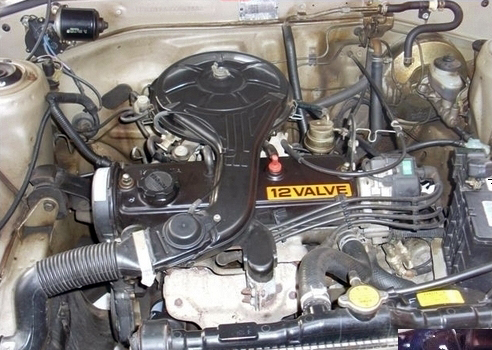Update Your Ride with Real Toyota Tazz Engine for Sale
Update Your Ride with Real Toyota Tazz Engine for Sale
Blog Article
Engine Purchasing Professional Tips on Selecting the Right Engine for Your Details Demands
Choosing the best engine for your certain demands entails a complicated interaction of aspects that go past simple horse power figures. By diving right into the intricacies of power versus efficiency, evaluating fuel rankings, and budgeting for long-term costs, one can genuinely optimize their engine choice.
Power Vs. Efficiency: Locating the Equilibrium

When picking an engine, it is essential to strike a balance between power and performance to meet your particular requirements properly. Power describes the engine's capability to generate power for propulsion, determining variables like velocity, lugging capacity, and general performance (Toyota Tazz Engine For Sale). On the other hand, effectiveness associates to just how well the engine uses gas to generate power, affecting aspects such as gas economy and ecological kindness
Achieving the ideal equilibrium in between power and effectiveness is essential because an engine that is also powerful might eat too much gas, leading to greater operating costs and unneeded stress on the setting. On the other hand, an engine that prioritizes performance over power may cause slow performance, especially in demanding situations like pulling heavy tons or driving uphill.
To make an educated decision, consider elements such as your common driving problems, the designated usage of the vehicle, and your individual choices. By reviewing your top priorities and needs, you can select an engine that strikes the ideal balance between power and effectiveness, making certain ideal performance while decreasing environmental effect and operating prices.
Understanding Engine Dimension and Type

In addition, engine kind plays a vital function in figuring out the performance attributes of an engine. Typical engine kinds consist of inline engines, V engines, and rotary engines, each with its unique benefits and disadvantages. The engine type affects elements such as the engine's dimension, weight distribution, and power shipment. Recognizing the interaction in between engine dimension and kind is essential in picking an engine that lines up with your particular demands and concerns, whether it be power, effectiveness, or an equilibrium of both.
Consider Your Car's Demands
Considering your car's demands is an essential action in the engine choice procedure to ensure optimum efficiency and performance. It is necessary to review aspects such as the meant use the vehicle, its weight, hauling capability, and gas effectiveness needs. For instance, if you are searching for an engine for a heavy-duty vehicle that will be utilized for towing, you will certainly require a powerful engine with high torque capabilities. On the various other hand, if you are picking an engine for a small auto largely made use of for city travelling, gas performance might be an extra crucial aspect her explanation to take into consideration.

Examining Fuel Effectiveness Ratings
Assessing fuel efficiency rankings is an important element of choosing the best engine for your lorry, ensuring price savings and environmental sustainability. Gas effectiveness scores, typically gauged in miles per gallon (MPG) for gas engines or kilowatt-hours per 100 miles (kWh/100 miles) for electrical engines, indicate exactly how far an automobile can travel on a particular amount of fuel or electrical energy. Greater MPG or reduced kWh/100 miles worths indicate extra effective engines, equating to minimized gas costs and reduced carbon discharges.
When reviewing gas efficiency ratings, consider your driving requirements and routines. If you commute cross countries daily, an extremely fuel-efficient engine can cause considerable cost savings gradually. Furthermore, compare various engine options within the very same car class to determine one of the most economical selection. Factors such as engine size, weight, the rules of aerodynamics, and hybrid or electrical capacities can all affect gas efficiency.
Budgeting for Long-Term Costs
Purposefully preparing for long-lasting costs is imperative when selecting an engine, guaranteeing financial sustainability over the automobile's life-span. While the first acquisition cost of an engine is a significant element, it is crucial to think about go to my blog the long-lasting costs related to upkeep, repair work, and fuel consumption. Going with a much more fuel-efficient engine may have a higher in advance price but can lead to substantial financial savings gradually. Routine upkeep, such as oil adjustments, filter replacements, and tune-ups, is vital to maintain the engine running smoothly and successfully, decreasing the risk of pricey repairs down the line.
Moreover, looking into the schedule and expense of substitute parts for the picked engine is important in budget preparation. By thoroughly budgeting for these lasting expenditures and factoring them right into the decision-making process, people can choose an engine that not only meets their immediate requirements however likewise remains economical throughout its life-span.
Conclusion
Finally, choosing the ideal engine for your certain demands calls for stabilizing power and performance, understanding engine size and type, considering your automobile's demands, examining gas efficiency ratings, and budgeting for long-term costs. By thoroughly considering these aspects, you can make sure that you choose an engine that satisfies your needs and offers optimum efficiency for your car.
To even more improve the selection process of an engine that strikes the optimal equilibrium in between power hop over to here and effectiveness, it is essential to dig right into the ins and outs of recognizing engine size and kind. Engine dimension refers to the complete quantity of air and fuel that can be pressed through the engine cylinders. Common engine types include inline engines, V engines, and rotating engines, each with its special advantages and disadvantages. Understanding the interaction in between engine dimension and kind is crucial in picking an engine that lines up with your certain needs and concerns, whether it be power, effectiveness, or a balance of both.
Gas performance rankings, usually measured in miles per gallon (MPG) for gas engines or kilowatt-hours per 100 miles (kWh/100 miles) for electrical engines, indicate how much a vehicle can take a trip on a particular amount of gas or electricity.
Report this page